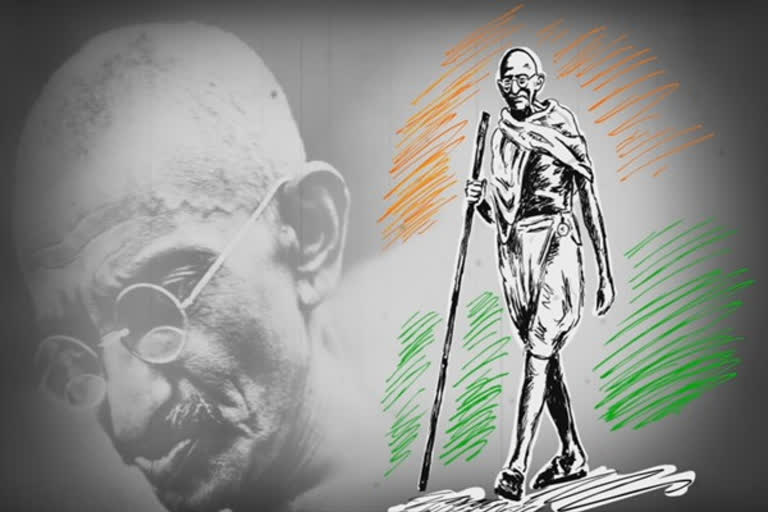New Delhi: Gandhiji’s principles of non-violence (ahimsa) and peaceful co-existence attracted a large number of Indians to his philosophy of practical life. In this, he was followed not only by Hindus but by Muslims also. Two Muslim leaders who were diehard supporters of Gandhian way of life and his principles of pacifism, coexistence, tolerance, and non-violence were Khan Abdul Ghaffar Khan and Maulana Azad.
While Mahatma Gandhi was fighting against the British colonialists in mainland India, the northwest fringes of the country, then known as the North-West Frontier Province, were witnessing the rise of yet another Mahatma- Khan Abdul Ghaffar Khan.
Khan Abdul Ghaffar Khan, famously known as Badshah Khan, and Baccha Khan, was a legendary Pashtun freedom fighter and a pacifist whose greatness transcended all tribal and communal divisions.
Though born and bred in a region infamous for its warring tribes and history of blood feuds—Pakistan’s North-West Frontier Province (NWFP or modern-day Khyber Pakhtunkhawa), Khan was a staunch follower of Mahatma Gandhi and his principle of non-violence. This love for ahimsa (non-violence) and Satyagraha (truth-force) earned him another nickname-the Frontier Gandhi.
Inspired with Gandhi’s ideas of non-violence and Satyagraha, Khan founded the Khudai Khidmatgar (Servants of God) Movement after returning from his Hajj in Mecca.
What attracted the masses to Khan was his uncompromising integrity and total commitment to the path of non-violence and an unwavering belief in a united India.
A great success, the movement attracted hundreds of thousands of adherents at the time – proving that the traditional martial Pashtun community could choose non-violent protest as their methods.
Khan met Mahatma Gandhi for the first time in 1928 and got involved with the Indian Congress Party. Very soon he became Gandhi's closest aide. Despite their different backgrounds – Gandhi had grown up in modest surroundings but had, in contrast to Khan, attended university – the two men spent many hours together debating politics, religion, and cultural issues.
Gandhiji was struck by Ghaffar Khan's transparent sincerity, frankness, and utmost simplicity. He was, in his view, a true Khudai Khidmatgar, Servant of God. He struck to the three prime ideals of life-amal, yaqeen, mohabbhat--right conduct, faith, and love.
Gandhi and Khan shared a common vision, a vision that was stronger than everything else. They dreamed of an independent, undivided, secular India – an India where both Hindus and Muslims would live together in peace.
Khan Abdul Ghaffar Khan's story will go down in the annals of nonviolent resistance not merely for its popularity but also for its innately simple and spiritual outlook.
As Badshah Khan used to say: " Nonviolence is love and it stirs courage in people... No peace or tranquillity can descend upon the people of the world until non-violence is practised."
Khan Abdul Ghaffar Khan, more than anything else, was a man of God who believed in service to humanity as service to God. Any religion that provoked conflict and fomented hatred, divided people and destroyed the unity of mankind, Ghaffar Khan condemned as not true religion.
Khan repeated over and over again that the concept of non-violence was anchored in the Holy Qur’an. He said, "It is the weapon of the Prophet, but you are not aware of it. That weapon is called patience and righteousness. No power on this planet can stand against it."
The other Muslim leader, a diehard Gandhi follower was Maulana Abul Kalam Azad, who was one of the most influential independence activists during India’s freedom struggle. He was also a noted writer, poet, and journalist. He was a prominent political leader of the Indian National Congress and was elected as Congress President in 1923 and 1940. Despite being a Muslim, Azad often stood against the radical policies of other prominent Muslims leaders like Muhammad Ali Jinnah.
After his return to India from an extensive visit of Egypt, Turkey, Syria, and France, Azad met prominent Hindu revolutionaries Sri Aurobindo Ghosh and Shyam Sundar Chakraborty. They helped in developing his radical political views and he began to participate in the Indian nationalist movement. Azad fiercely criticised the Muslim politicians who were more inclined towards the communal issues without focusing on the national interest. He also rejected the theories of communal separatism advocated by the All India Muslim League.
As an activist demanding the reinstatement of the Caliph in Istanbul, Maulana Abul Kalam Azad came on-board with the Khilafat movement started by the INC during 1920. He became involved with the Indian freedom struggle through the Non-cooperation movement initiated by Gandhi, of which the Khilafat issue was a big part.
While extending his support to Mahatma Gandhi and non-cooperation movement, Maulana Azad joined the Indian National Congress on January 1920. He presided over the special session of Congress on September 1923 and was said to be the youngest elected President of the Congress.
Maulana Azad emerged as an important national leader of the Indian National Congress Party. He also served as a member of the Congress Working Committee (CWC) and in the offices of general secretary and president on numerous occasions. Azad also advocated for the ending of separate electorates based on religion and called for a single nation committed to secularism.
Maulana was a firm believer in the co-existence of religions. His dream was that of a unified independent India where Hindu and Muslims cohabited peacefully. Although this vision of Azad was shattered post partition of India, he remained a believer in coexistence and tolerance. He was the founder of Jamia Millia Islamia in Delhi along with fellow Khilafat leaders, an institution which has now blossomed into a renowned university today, educating Indians of all hues and imbibe them with the spirit and teachings of its founders.
Also read: Satyagraha: Gandhi's alternative to Ahimsa for Champaran movement



